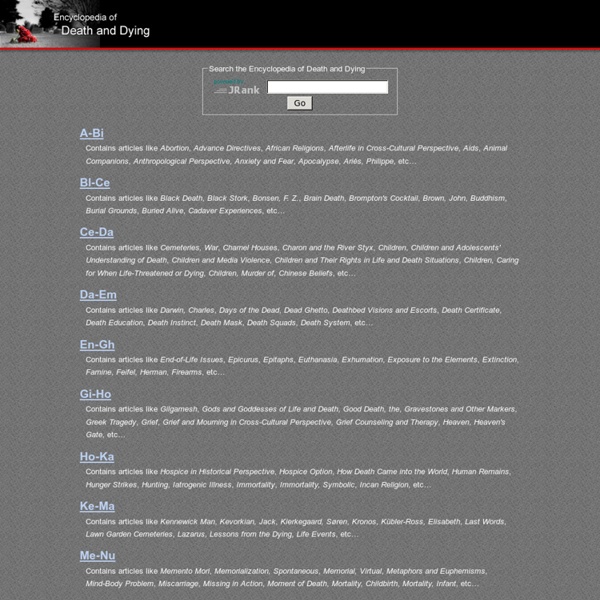



Literary Encyclopedia | Welcome Simon Critchley on the History of Death (transcript) Transcript Question: How do contemporary societies conceive of death? Critchley: Every culture has had rituals around death, all right. Question: How did the Greeks conceive of death? Critchley: Philosophy begins with Plato, with Plato’s transcriptions of these dialogues. The Human Soul It is clear and evident that when the veils that conceal the realities of the manifestations of the Names and Attributes of God, nay of all created things visible or invisible, have been rent asunder, nothing except the Sign of God will remain - a sign which He, Himself, hath placed within these realities. This sign will endure as long as is the wish of the Lord thy God, the Lord of the heavens and of the earth. If such be the blessings conferred on all created things, how superior must be the destiny of the true believer, whose existence and life are to be regarded as the originating purpose of all creation. Just as the conception of faith hath existed from the beginning that hath no beginning, and will endure till the end that hath no end, in like manner will the true believer eternally live and endure. His spirit will everlastingly circle round the Will of God. Know thou that the soul of man is exalted above, and is independent of all infirmities of body or mind. O My servants!
The Conversation: In-depth analysis, research, news and ideas from leading academics and researchers. Encyclopedia of Myths Britannica Online Encyclopedia Biocentrism Explains Why There’s No Time and No Death Okay, I admit it. They had me at “You won’t actually die.” I want to believe. The idea sprang from Lanza’s observation of a spider monitoring its web. In a column Lanza and Berman wrote for Aeon, they say “It turns out that everything we see and experience is a whirl of information occurring in our head… Rather, space and time are the tools our mind uses to put it all together.” The authors cite a range of intellectual luminaries who themselves had doubts about times’ reality, including Albert Einstein, who wrote on the passing of his friend Michele Besso, “Now he has departed from this strange world a little ahead of me. British physicist Julian Barbour also says time isn't real: “Quite the contrary, time is an abstraction at which we arrive through the changes of things.” In biocentrism, we could think of time like a CD music album: All the music’s all there all the time; the only thing that changes, essentially, is which song we listen to. Headline image: Phillip Pessar
The Truth about spontaneous Chi Kung ( Jinns / Demonic Possession )